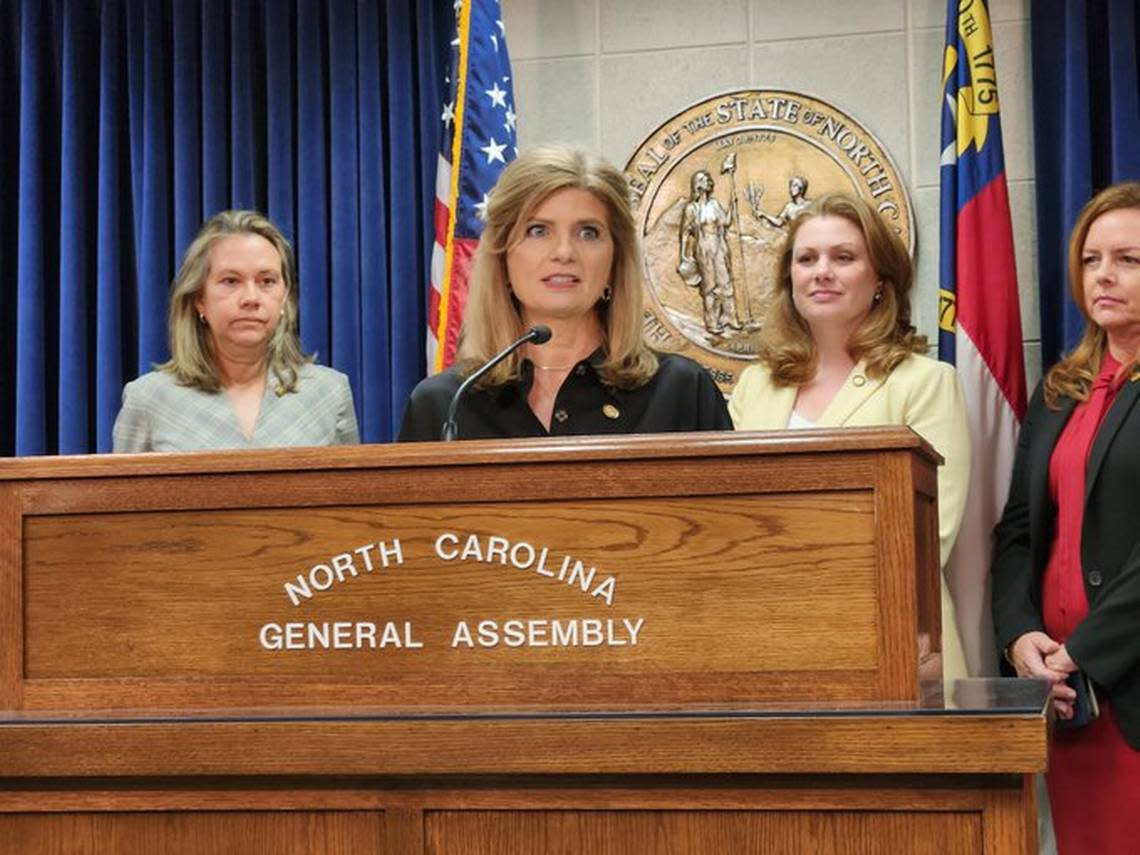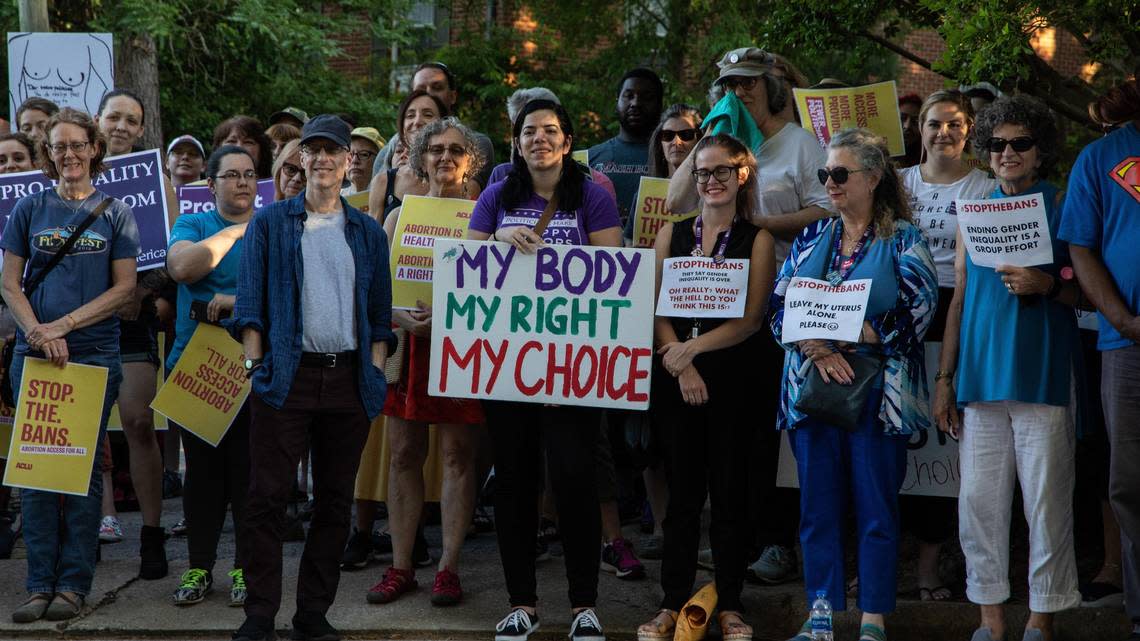Abortion ban after 12 weeks to move forward in NC legislature after GOP reaches deal
Republican state lawmakers said Tuesday that they have reached a consensus after months of negotiations and will unveil a 12-week abortion ban, with exceptions, this week.
The agreement between the House and Senate’s GOP leaders on banning abortion after the first trimester, or after the first 12 weeks of pregnancy, comes after months of internal talks among Republicans over what kind of new restrictions all members of the party could get behind and vote for.
Republicans said they settled on banning most abortions after the first trimester. Abortions are currently banned after 20 weeks of pregnancy, with an exception for medical emergencies. The 20-week ban had been blocked by a federal judge, but was reinstated in August following the U.S. Supreme Court’s decision overturning Roe v. Wade. Prior to that, abortions were allowed up until the point of fetal viability — generally around 23 or 24 weeks.
The bill was expected to roll out Tuesday night as a replacement for Senate Bill 20, which deals with protecting abandoned newborns. The new version cannot be amended, so there will only be yes-or-no votes on the House and Senate floor, where it is expected to go on Wednesday and Thursday.
Many Republicans had been split between a first-trimester ban of the kind that lawmakers ultimately settled on, and a more restrictive six-week ban supported by the more conservative wing of the party. During Tuesday’s announcement, GOP leaders said they had secured commitments from all 30 Republicans in the Senate and all 72 Republicans in the House to vote for the bill.
Republicans have a veto-proof supermajority, three-fifths in the General Assembly, so when Democratic Gov. Roy Cooper vetoes a bill, there are enough votes to overturn his veto.
The bill, as outlined by Republicans in a news conference Tuesday, would make exceptions allowing abortion up to 20 weeks for pregnancies caused by rape and incest, up to 24 weeks for those with certain fetal anomalies, and no limit at all if the mother’s life is in danger.
“Last year when the U.S. Supreme Court handed down the Dobbs decision, those of us who have been working to save lives of unborn babies for decades, saw a great opportunity — an opportunity to put forward pro-life, pro-woman legislation,” said Sen. Joyce Krawiec, a Forsyth County Republican.
“Here in North Carolina, our archaic abortion laws date back to the 1970s in response to Roe v. Wade. Since then, our laws have allowed abortions through the second trimester of a woman’s pregnancy. That is unacceptable,” Krawiec said.
She said lawmakers have the opportunity to save lives and provide women and families options “that they haven’t had before.”
Republicans said the bill includes funding for contraception, crisis pregnancy centers, reducing maternal death rates, adoption tax credits, child care grants and foster care.
The penalty for violating the new law would be on doctors, who would get a $5,000 fine and could also be reported to the Medical Society, they said.
Rep. Sarah Stevens said lawmakers “are pleased that the unborn will be recognized as having a fundamental right to be born, and mothers will get our unconditional support. It’s time to catch up with the science that affirms parenthood before birth. This is a pro-woman, holistic approach.”
Exceptions for rape and incest would be based on what is designated by the doctor performing the abortion after 12 weeks and reported to the N.C. Department of Health and Human Services, Stevens said. “That is between the doctor and the patient,” she said, and reported as information collected that is sent to DHHS.

When the law could change
With Republicans coming to an agreement, North Carolina could be weeks, if not days, away from enacting new abortion restrictions.
In order to pass new restrictions into law, Republicans would need to override an almost certain veto from Cooper. Republicans were previously one seat short of being able to do that, but after Rep. Tricia Cotham switched parties and joined the GOP last month, they have the votes to do so all on their own.
That doesn’t necessarily mean the eventual votes in the House and Senate will fall exactly along party lines, since a small group of Democrats in the House have shown a willingness to vote with Republicans on key bills this session.
Republicans said they expect some Democratic support for the abortion bill, though no Democrats were in the working group between the chambers about what the bill would be. Sen. Amy Scott Galey, an Alamance County Republican, said she had reached out to a Senate Democrat early in the process and asked her “if there would be any room to work with the Democrats on this issue” and was told no.
Asked about upcoming abortion legislation, Cooper told reporters Tuesday morning that he has “concerns about restricting women’s reproductive freedom.” And as Republicans unveiled their proposal, he tweeted that the plan “erodes even further the freedom of women and their doctors to make deeply personal health care decisions. I along with most North Carolinians are alarmed by the overreach of Republican politicians into people’s personal lives and I strongly oppose it.”
Outside the press conference room Tuesday night, some Democrats first heard the details of the bill.
Sen. Mary Wills Bode, a Wake County Democrat, took issue with the process, saying not including Democratic lawmakers was an “incredible disservice to the people.”
“There is no amendment opportunity on the floor,” Bode told reporters, because of the bill being a replacement. “It is just an up-or-down vote. And for an issue that is important as this?”
Rep. Laura Budd, a Matthews Democrat, said that there was “certainly no inquiry to my knowledge to the [House Democratic] women.”
“No one ever reached out to me and said, ‘Hey, Rep. Budd, what do you think as a woman of childbearing age who also has a 17-year-old daughter?”
Abortion landscape in North Carolina
In North Carolina, the vast majority of abortions are performed before the 12-week mark. About 7% of abortions were performed after that point in 2020, according to the most recent data posted by the N.C. Department of Health and Human Services.

Doctors and abortion-rights advocates worry the ban would have dire consequences for that small and often vulnerable group of patients.
That 7% often encompasses people who delay the procedure as they struggle to find or afford health care, said Dr. Beverly Gray, an OB-GYN at Duke Health. It includes teenagers who wait to tell their parents they’re pregnant. After the Supreme Court’s decision, with strict abortion bans in large swaths of the South, many more women face delays in finding an appointment at an out-of-state clinic, potentially pushing the abortion later in their pregnancy.
“You could be already 10 weeks pregnant when you realize you are pregnant,” Rivera said. “Then, if you live in Florida, you’ve got to figure out a way to get to Chapel Hill — and that’s if there’s even an appointment available to you.”
North Carolina has become an abortion destination for Southern women. In the months after Roe v. Wade was overturned, the number of abortions provided in the state shot up by 37%. As a result, North Carolina’s abortion clinics have, at some points, had a four-week waiting list for appointments.
“North Carolina became the one place where many women throughout the Southeast could come,” Democratic Sen. Val Applewhite said.
“So this does not just affect North Carolina,” said Applewhite, of Cumberland County. “It affects surrounding states as well, as more restrictions are put in place. So this is a big deal. Not just for us.”
North Carolina Senate Minority Leader Dan Blue, a Raleigh Democrat, said just before the announcement that he and most Senate Democrats want to codify Roe v. Wade.
If lawmakers left the decision to get an abortion “up to a woman and her doctor, that would be very satisfactory with me rather than all of these conditions, with mostly men telling women what to do on health issues,” he said.
Budd told The N&O that Democrats would do “our very best to get people to call their representatives from other sides of the aisle to voice their opposition. The advocacy groups can really make a stand with us. And frankly, if it passes, I think that that is a bellwether for 2024.”
“If women really, really want to be in control of their bodies and make their own decisions, they are going to have to get out and vote in force and in numbers to tell the Republican Party: That’s not what we wanted. That’s not what we deserved, and vote them out,” she said.
